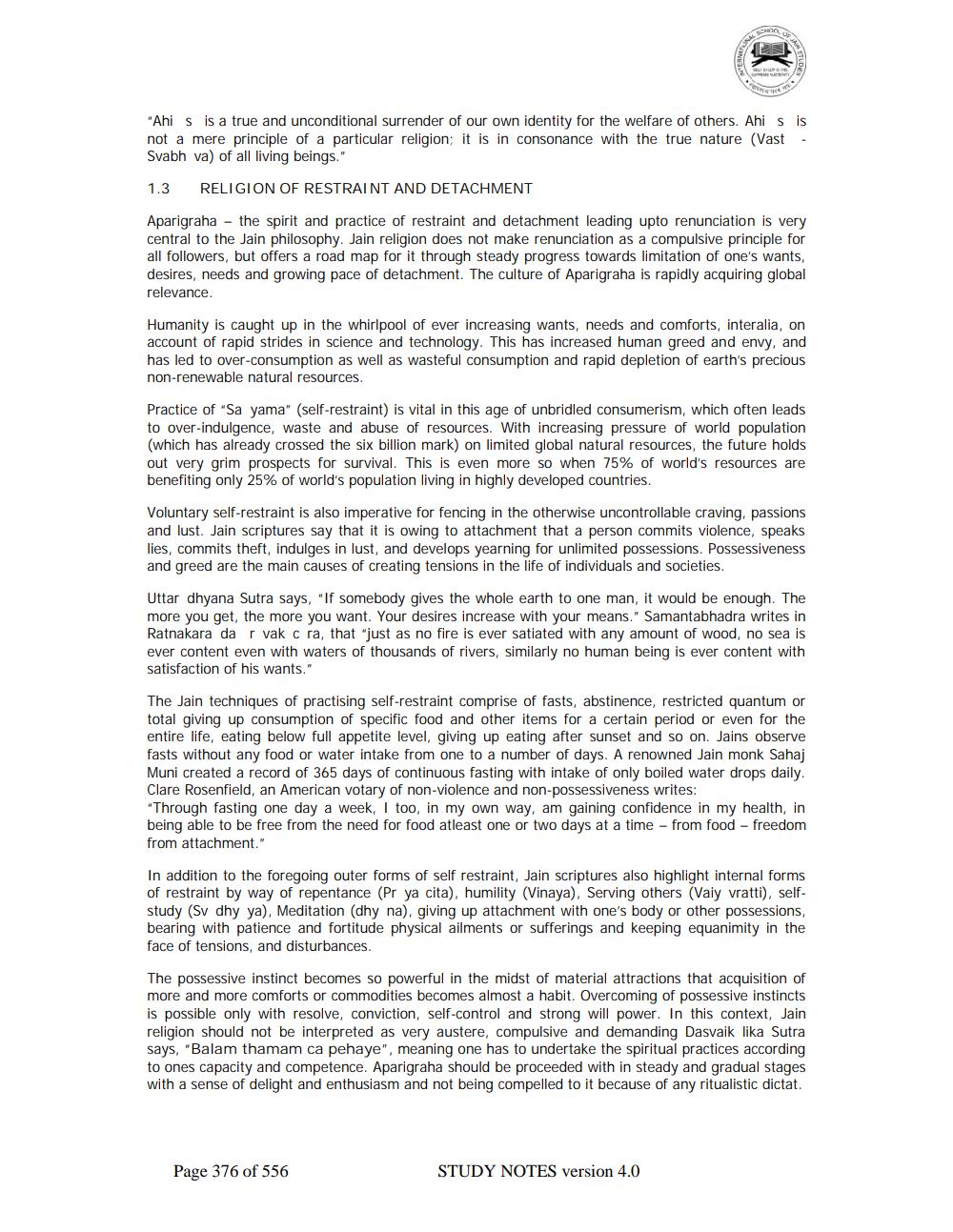________________
"Ahis is a true and unconditional surrender of our own identity for the welfare of others. Ahis is not a mere principle of a particular religion; it is in consonance with the true nature (Vast Svabh va) of all living beings."
1.3
RELIGION OF RESTRAINT AND DETACHMENT
Aparigraha the spirit and practice of restraint and detachment leading upto renunciation is very central to the Jain philosophy. Jain religion does not make renunciation as a compulsive principle for all followers, but offers a road map for it through steady progress towards limitation of one's wants, desires, needs and growing pace of detachment. The culture of Aparigraha is rapidly acquiring global relevance.
Humanity is caught up in the whirlpool of ever increasing wants, needs and comforts, interalia, on account of rapid strides in science and technology. This has increased human greed and envy, and has led to over-consumption as well as wasteful consumption and rapid depletion of earth's precious non-renewable natural resources.
Practice of "Sa yama" (self-restraint) is vital in this age of unbridled consumerism, which often leads to over-indulgence, waste and abuse of resources. With increasing pressure of world population (which has already crossed the six billion mark) on limited global natural resources, the future holds out very grim prospects for survival. This is even more so when 75% of world's resources are benefiting only 25% of world's population living in highly developed countries.
Voluntary self-restraint is also imperative for fencing in the otherwise uncontrollable craving, passions and lust. Jain scriptures say that it is owing to attachment that a person commits violence, speaks lies, commits theft, indulges in lust, and develops yearning for unlimited possessions. Possessiveness and greed are the main causes of creating tensions in the life of individuals and societies.
Uttar dhyana Sutra says, "If somebody gives the whole earth to one man, it would be enough. The more you get, the more you want. Your desires increase with your means." Samantabhadra writes in Ratnakara dar vak c ra, that "just as no fire is ever satiated with any amount of wood, no sea is ever content even with waters of thousands of rivers, similarly no human being is ever content with satisfaction of his wants."
The Jain techniques of practising self-restraint comprise of fasts, abstinence, restricted quantum or total giving up consumption of specific food and other items for a certain period or even for the entire life, eating below full appetite level, giving up eating after sunset and so on. Jains observe fasts without any food or water intake from one to a number of days. A renowned Jain monk Sahaj Muni created a record of 365 days of continuous fasting with intake of only boiled water drops daily. Clare Rosenfield, an American votary of non-violence and non-possessiveness writes:
"Through fasting one day a week, I too, in my own way, am gaining confidence in my health, in being able to be free from the need for food atleast one or two days at a time - from food - freedom from attachment."
In addition to the foregoing outer forms of self restraint, Jain scriptures also highlight internal forms of restraint by way of repentance (Pr ya cita), humility (Vinaya), Serving others (Vaiy vratti), selfstudy (Sv dhy ya), Meditation (dhy na), giving up attachment with one's body or other possessions, bearing with patience and fortitude physical ailments or sufferings and keeping equanimity in the face of tensions, and disturbances.
The possessive instinct becomes so powerful in the midst of material attractions that acquisition of more and more comforts or commodities becomes almost a habit. Overcoming of possessive instincts is possible only with resolve, conviction, self-control and strong will power. In this context, Jain religion should not be interpreted as very austere, compulsive and demanding Dasvaik lika Sutra says, "Balam thamam ca pehaye", meaning one has to undertake the spiritual practices according to ones capacity and competence. Aparigraha should be proceeded with in steady and gradual stages with a sense of delight and enthusiasm and not being compelled to it because of any ritualistic dictat.
Page 376 of 556
STUDY NOTES version 4.0




